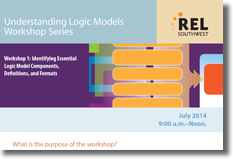Understanding Logic Models Workshop Series

On July 17, Empirical Education facilitated the first of two workshops for practitioners in New Mexico on the development of program logic models, one of the first steps in developing a research agenda. The workshop, entitled “Identifying Essential Logic Model Components, Definitions, and Formats”, introduced the general concepts, purposes, and uses of program logic models to members of the Regional Education Lab (REL) Southwest’s New Mexico Achievement Gap Research Alliance. Throughout the workshop, participants collaborated with facilitators to build a logic model for a program or policy that participants are working on or that is of interest.
Empirical Education is part of the REL Southwest team, which assists Arkansas, Louisiana, New Mexico, Oklahoma, and Texas in using data and research evidence to address high-priority regional needs, including charter school effectiveness, early childhood education, Hispanic achievement in STEM, rural school performance, and closing the achievement gap, through six research alliances. The logic model workshops aim to strengthen the technical capacity of New Mexico Achievement Gap Research Alliance members to understand and visually represent their programs’ theories of change, identify key program components and outcomes, and use logic models to develop research questions. Both workshops are being held in Albuquerque, New Mexico.
